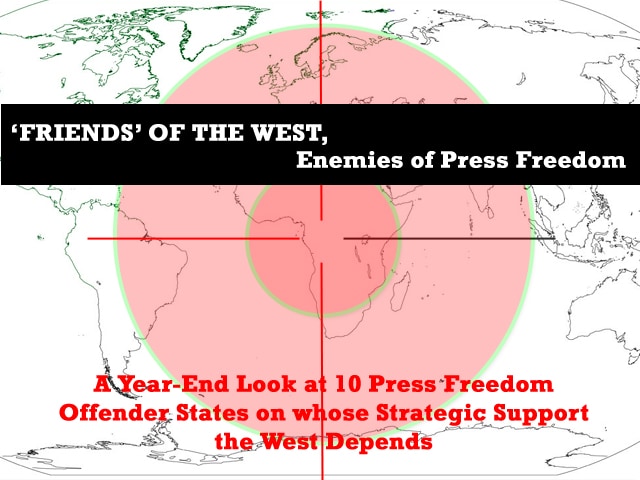In "'Friends' of the West, enemies of press freedom", IPI highlights the press freedom situations in Turkey, Azerbaijan, Ethiopia, Saudi Arabia, Uzbekistan, Turkmenistan, Kazakhstan, Afghanistan, Pakistan and Hungary.
(IPI/IFEX) – Vienna, 28 Dec. 2011 – At the close of the year, the International Press Institute (IPI) takes a look at 10 states that have poor records on press freedom, but on whose strategic support the west depends. These ‘Friends’ of the West, Enemies of Press Freedom are listed in no particular order below.
Turkey
Friend:
Relations between the west and Turkey – a NATO member since 1952 and still theoretically a candidate to join the European Union – have cooled in recent years, but U.S. Defense Secretary Leon Panetta earlier this month said on a visit to Turkey that the country remains a “key ally”. Western powers have often turned to Turkey, which serves as a bridge between the west and the Muslim world, for help in supporting the transitions to democracy in Iraq, Egypt and Libya, and in confronting the regimes in Syria and Iran.
Press Freedom Enemy:
Turkey presented one of the worst press freedom pictures in Europe, with a judge from the European Court of Human Rights saying in November that the country had taken the lead among Council of Europe members in violations of freedom of expression, including press freedom. The Freedom for Journalists Platform, an umbrella group representing 94 national and local groups in Turkey, said early this month that the government was holding 64 journalists in jail, a number that increased last week with the arrest of 29 Kurdish journalists following raids across the country that have heightened an ongoing climate of fear. Most jailed journalists are accused of terrorism-related offences, often on the grounds of spreading propaganda. While the majority are accused of ties to banned Kurdish or Marxist groups, the government has implicated a significant number in the ongoing probe of the alleged “Ergenekon” plot by secularists and ultra-nationalists to use terrorism to overthrow the ruling Justice and Development Party (AKP)-led government.
Azerbaijan
Friend:
Since achieving independence in 1991, Azerbaijan has actively participated in NATO’s Partnership for Peace program connecting the group with other states in Europe and the former Soviet Union. It participated in United States-led missions in Kosovo, Afghanistan and Iraq, and has provided overflight, refuelling and landing rights for coalition aircraft headed to the latter two countries. A strategic partner in the so-called ‘war on Terror’, Azerbaijan has also shared information with the west to combat terrorism financing and has apprehended and prosecuted suspected terrorists
.
Press Freedom Enemy:
The government of Azerbaijani President Ilham Aliyev this year cracked down on protests inspired by demonstrations across the Arab world. A number of journalists were beaten, both in connection with, and independently of, the protests, and journalist and writer Rafiq Tagi died in November, four days after he was stabbed outside his Baku home in what he speculated was an attack targeting him for an article he wrote criticising Iran’s government. Journalists have described a climate of intimidation, including a litany of instances of harassment, one of the most glaring of which was the brutal June attack on an American freelance contributor to The Washington Post and The New York Times and a British staffer at the Baku-based Institute for Reporters’ Freedom and Safety shortly before they were to meet with journalist Eynulla Fatullayev following his release from prison.
(. . .)



